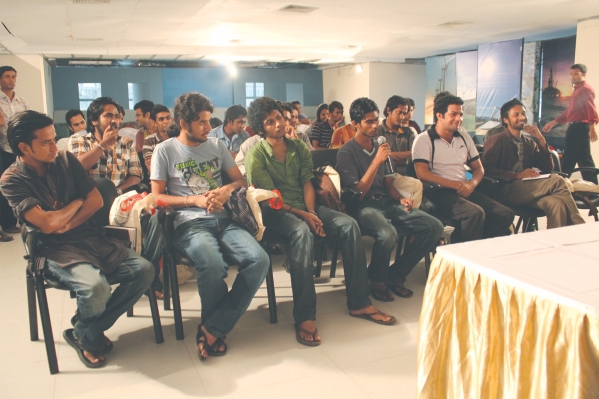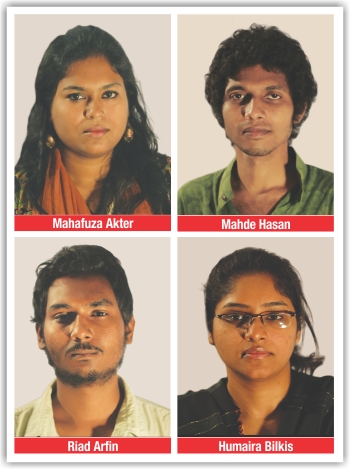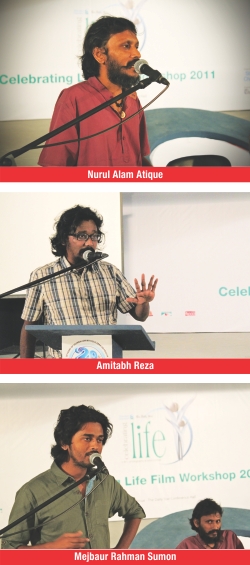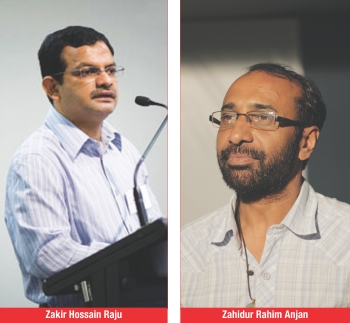Film Workshop
Better Films through
Capacity Building
How is the Film Making Workshop going? After two years of film entries not being of acceptable quality, the organizers of Celebrating Life took matters into their own hands. Starting in 2011, in order to build capacity amongst potential film makers, the Film Making Workshop was added to the plethora of components of Celebrating Life. The following article presents not only the activities of the Film Making Workshop of Celebrating Life 2011, but also focuses on the participants' views about it.
.........................................................................................
Zia Nazmul Islam

Mahfuza Akter was ready to take the adventure of a lifetime climbing to Mt. Everest's base camp. She is not only an adventurous “chic” but is also a certified physician from Salimullah Medical College. But she is not going to the Everest and she is not treating patients. For Mahafuza Aktar, being selected and participating in the Celebrating Life Film Making Workshop is an opportunity too big to be thrown away. The amazing stories and the sacrifices of the participants of the Celebrating Life 2011 Film Making Workshop could be a well-crafted movie itself. She, like many others in the workshop is here with a goal: to bring the Bangladeshi audience back into the cinema halls with their creations - not by offering cheap entertainment that is produced with purely commercial intentions but to lure them with artful films.
 After a grueling process of selection, the participants have taken their place as the 30 “lucky ones”. Why not call them the 30 eligible ones rather than lucky ones? After all, they were carefully picked from 1200 hopefuls to join. Rafi Hossain, the Festival Coordinator of Celebrating Life, says “some could have sneaked in by impressing the interviewer and that is why there is an elimination process”. With the “blessing” of pirated DVDs and the internet we have a new group of people, who are, in some sense, film buffs. Hollywood and Bollywood is now “so yesterday” to them. They are well informed about East Asian, South American, European films or even early silent films. You can have a lively conversation with them about films but here in the workshop all the participants need to be more than just students of a film appreciation course. So, in the end, only fifteen will survive to have the opportunity to be take part in film making with young and talented directors like Mejbaur Rahman Sumon, Nurul Alam Atique and Amitabh Reza. After 4 weeks, 6 have fallen, and 24 survive. After a grueling process of selection, the participants have taken their place as the 30 “lucky ones”. Why not call them the 30 eligible ones rather than lucky ones? After all, they were carefully picked from 1200 hopefuls to join. Rafi Hossain, the Festival Coordinator of Celebrating Life, says “some could have sneaked in by impressing the interviewer and that is why there is an elimination process”. With the “blessing” of pirated DVDs and the internet we have a new group of people, who are, in some sense, film buffs. Hollywood and Bollywood is now “so yesterday” to them. They are well informed about East Asian, South American, European films or even early silent films. You can have a lively conversation with them about films but here in the workshop all the participants need to be more than just students of a film appreciation course. So, in the end, only fifteen will survive to have the opportunity to be take part in film making with young and talented directors like Mejbaur Rahman Sumon, Nurul Alam Atique and Amitabh Reza. After 4 weeks, 6 have fallen, and 24 survive.
Riad Arfin, one of those survivors in the workshop has never heard of anyone using the word “honesty” with film making. But, honesty in film making was mentioned several times by Zahidur Rahim Anjan a lecturer of Film and Media at Stamford University, who is also one of the guest speakers at the workshop. We hear honesty in politics, in business or in life but not in film making. He explained how not compromising with anything when it comes to values, art and aesthetics implies honest film making. Riad completely agrees with Zahidur Rahim Anjan and feels that is exactly what is missing from Bangladesh's film industry. He is a freelance photographer with a passion to make movies. He feels, within the first four weeks of the workshop - the complex grammar of filmmaking was tactfully illustrated by great guest speakers. For instance, he says, he had read books, listened to lectures, but film language always remained Greek to him. Two days of elaborative yet concise discussions by Zahidur Rahim Anjan has cleared up his idea of the term “film language”.
 There is always pressure from family to get a proper degree and then to get a job. Mahde Hasan has done all those. He got his Masters in Anthropology from Jahangirnagar University and held respectable jobs. Yet his love for film brought him to this workshop. After completion of his degree, he has attended many other workshops. When asked about the difference of this workshop, he says, “I didn't even know the definition of film until I came here”. To him, being selected for Celebrating Life Film workshop is like being awarded a scholarship. “Having close interaction with young talented TV and Film personalities, listening to the mind boggling lectures from distinguished resource persons and watching world renowned movies on a large projection screen, what else can you call it but a scholarship?” There is always pressure from family to get a proper degree and then to get a job. Mahde Hasan has done all those. He got his Masters in Anthropology from Jahangirnagar University and held respectable jobs. Yet his love for film brought him to this workshop. After completion of his degree, he has attended many other workshops. When asked about the difference of this workshop, he says, “I didn't even know the definition of film until I came here”. To him, being selected for Celebrating Life Film workshop is like being awarded a scholarship. “Having close interaction with young talented TV and Film personalities, listening to the mind boggling lectures from distinguished resource persons and watching world renowned movies on a large projection screen, what else can you call it but a scholarship?”
There were many others but Humaira Blikis and Mahafuza Akter were the only two women selected to attend the workshop. When asked how they feel about the fact that there are so few female directors in the industry to set examples for them, they couldn't care less. They feel they are here on their own right and ability and this confidence will take them where they want to go. It is like a journey to both of them and they will not stop until they reach their destination. Both know the obstacles facing women in a traditional country like Bangladesh, particularly the mindset families hold against women working in the media scene. They are not here to bring revolution in society or in the industry, they say, but they are just part of the ongoing process where people will no longer ask them the question, “What are you doing here?”, just because they are female.
Everyone was surprised, when on week four Nurul Alam Atique (one of the workshop facilitators) brought with him a strange fish trap in class. He described how this contraption can become a symbol in a film. These kinds of innovative ideas intrigue Humaira Blikis. She knows, ideas from young filmmakers will take our movies in par with movies screened in respected film festivals. What a treat, she says, to interact with great minds who are speaking at the workshop. Humaira herself is not new at video production; she holds a double Masters with a job as Lecturer of Mass Communication at Independent University of Bangladesh. She was involved in several small productions for NGOs. To her, film has its own place. Even the current trend of TV drama has not diminished her desire to produce films. She thinks, films are not apart from politics or philosophy and feels it is a catalyst to change the society for the better.
 Any student of films knows how it all began. They know the contributions of Eisestein and DW Griffith in the early days of cinema, most even sat through hours of watching silent films. It could have been a case of déjà vu for most participants in the workshop when Zakir Hossain Raju (The first Bangladeshi PhD holder in the subject of Films) was delivering a 3-day lecture on the History of Cinema. But he came up with a twist by discussing history of Asian Cinema on Day 2 and the history of Bangladeshi Cinema on Day 3. For Mahafuza Akter, those were enlightening moments that helped her to learn about the industry that she wants to work in. She was throwing questions at Mr. Zakir like a child. She felt like she was being led through a labyrinth by someone who knew exactly how to navigate through it. She was not going to miss the chance to know as much as she can as there are not many books around about the history of Bangladeshi Cinema. Later, viewing of some great Bangladeshi documentaries made it a perfect ending to the 3-day orientation to the historical account presented by Mr. Zakir. Any student of films knows how it all began. They know the contributions of Eisestein and DW Griffith in the early days of cinema, most even sat through hours of watching silent films. It could have been a case of déjà vu for most participants in the workshop when Zakir Hossain Raju (The first Bangladeshi PhD holder in the subject of Films) was delivering a 3-day lecture on the History of Cinema. But he came up with a twist by discussing history of Asian Cinema on Day 2 and the history of Bangladeshi Cinema on Day 3. For Mahafuza Akter, those were enlightening moments that helped her to learn about the industry that she wants to work in. She was throwing questions at Mr. Zakir like a child. She felt like she was being led through a labyrinth by someone who knew exactly how to navigate through it. She was not going to miss the chance to know as much as she can as there are not many books around about the history of Bangladeshi Cinema. Later, viewing of some great Bangladeshi documentaries made it a perfect ending to the 3-day orientation to the historical account presented by Mr. Zakir.
The workshop runs on a tight shift. Punctuality and regularity are must. Attentiveness during class, film screening and group discussion is expected. The workshop runs for six hours on Thursdays and Fridays, and on Saturdays it runs for twelve long with very little break in between. Riad, Mahde, Humaira and Mahafuza see this school-like discipline as something essential for character building for a future film maker. They know, this discipline builds their mental and physical stamina and will take them a long way. Talent is important, they say, but without hard work it will only take you so far. You need to work for long hours while having your mind focused in order to survive in the industry. They even suggested arranging the workshop for more than 3 days a week. They love being in a film environment where like-minded people under the same roof are sharing ideas and their passion. Also, the style of presentation and delivering lectures by the speakers and their willingness to share their knowledge makes the workshop effective, according to most of the participants. The unity and the bond that has grown between and amongst the first batch of participants in the Film Making Workshop, the organizers and coordinators are striking. Sharing lecture notes, having lively debates about scripts, watching movies together or arranging meetings though Facebook light up the environment. After the end of each week they can't wait for the next Thursday to arrive. That is the level of devotion these participants are showing. Organizers and coordinators expect nothing less from them.
What happens if they don't make it till the end? After all, only 15 of the remaining 24 will reach the very end and work with the facilitators in the production of three individual films, so 5 finalists with each workshop facilitator. With a very talented group of co-participants, there is a stiff competition to survive till the last day. Riad, Mahde, Humaira and Mahafuza are not thinking of it right now. They want to learn as much as they can from the workshop. Opportunities like this don't come often. They are ready to take the challenge facing them in the coming weeks. But, in case they aren't in the final 15, even if they don't make it, the journey will still go on for the four optimistic participants.
Interested in Celebrating Life competitions over the years?
Log on to www.celebratinglifebd.com
Copyright
(R) thedailystar.net 2011
|
|


 After a grueling process of selection, the participants have taken their place as the 30 “lucky ones”. Why not call them the 30 eligible ones rather than lucky ones? After all, they were carefully picked from 1200 hopefuls to join. Rafi Hossain, the Festival Coordinator of Celebrating Life, says “some could have sneaked in by impressing the interviewer and that is why there is an elimination process”. With the “blessing” of pirated DVDs and the internet we have a new group of people, who are, in some sense, film buffs. Hollywood and Bollywood is now “so yesterday” to them. They are well informed about East Asian, South American, European films or even early silent films. You can have a lively conversation with them about films but here in the workshop all the participants need to be more than just students of a film appreciation course. So, in the end, only fifteen will survive to have the opportunity to be take part in film making with young and talented directors like Mejbaur Rahman Sumon, Nurul Alam Atique and Amitabh Reza. After 4 weeks, 6 have fallen, and 24 survive.
After a grueling process of selection, the participants have taken their place as the 30 “lucky ones”. Why not call them the 30 eligible ones rather than lucky ones? After all, they were carefully picked from 1200 hopefuls to join. Rafi Hossain, the Festival Coordinator of Celebrating Life, says “some could have sneaked in by impressing the interviewer and that is why there is an elimination process”. With the “blessing” of pirated DVDs and the internet we have a new group of people, who are, in some sense, film buffs. Hollywood and Bollywood is now “so yesterday” to them. They are well informed about East Asian, South American, European films or even early silent films. You can have a lively conversation with them about films but here in the workshop all the participants need to be more than just students of a film appreciation course. So, in the end, only fifteen will survive to have the opportunity to be take part in film making with young and talented directors like Mejbaur Rahman Sumon, Nurul Alam Atique and Amitabh Reza. After 4 weeks, 6 have fallen, and 24 survive. There is always pressure from family to get a proper degree and then to get a job. Mahde Hasan has done all those. He got his Masters in Anthropology from Jahangirnagar University and held respectable jobs. Yet his love for film brought him to this workshop. After completion of his degree, he has attended many other workshops. When asked about the difference of this workshop, he says, “I didn't even know the definition of film until I came here”. To him, being selected for Celebrating Life Film workshop is like being awarded a scholarship. “Having close interaction with young talented TV and Film personalities, listening to the mind boggling lectures from distinguished resource persons and watching world renowned movies on a large projection screen, what else can you call it but a scholarship?”
There is always pressure from family to get a proper degree and then to get a job. Mahde Hasan has done all those. He got his Masters in Anthropology from Jahangirnagar University and held respectable jobs. Yet his love for film brought him to this workshop. After completion of his degree, he has attended many other workshops. When asked about the difference of this workshop, he says, “I didn't even know the definition of film until I came here”. To him, being selected for Celebrating Life Film workshop is like being awarded a scholarship. “Having close interaction with young talented TV and Film personalities, listening to the mind boggling lectures from distinguished resource persons and watching world renowned movies on a large projection screen, what else can you call it but a scholarship?” Any student of films knows how it all began. They know the contributions of Eisestein and DW Griffith in the early days of cinema, most even sat through hours of watching silent films. It could have been a case of déjà vu for most participants in the workshop when Zakir Hossain Raju (The first Bangladeshi PhD holder in the subject of Films) was delivering a 3-day lecture on the History of Cinema. But he came up with a twist by discussing history of Asian Cinema on Day 2 and the history of Bangladeshi Cinema on Day 3. For Mahafuza Akter, those were enlightening moments that helped her to learn about the industry that she wants to work in. She was throwing questions at Mr. Zakir like a child. She felt like she was being led through a labyrinth by someone who knew exactly how to navigate through it. She was not going to miss the chance to know as much as she can as there are not many books around about the history of Bangladeshi Cinema. Later, viewing of some great Bangladeshi documentaries made it a perfect ending to the 3-day orientation to the historical account presented by Mr. Zakir.
Any student of films knows how it all began. They know the contributions of Eisestein and DW Griffith in the early days of cinema, most even sat through hours of watching silent films. It could have been a case of déjà vu for most participants in the workshop when Zakir Hossain Raju (The first Bangladeshi PhD holder in the subject of Films) was delivering a 3-day lecture on the History of Cinema. But he came up with a twist by discussing history of Asian Cinema on Day 2 and the history of Bangladeshi Cinema on Day 3. For Mahafuza Akter, those were enlightening moments that helped her to learn about the industry that she wants to work in. She was throwing questions at Mr. Zakir like a child. She felt like she was being led through a labyrinth by someone who knew exactly how to navigate through it. She was not going to miss the chance to know as much as she can as there are not many books around about the history of Bangladeshi Cinema. Later, viewing of some great Bangladeshi documentaries made it a perfect ending to the 3-day orientation to the historical account presented by Mr. Zakir.